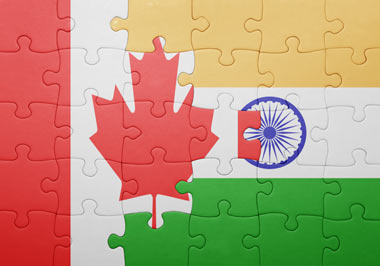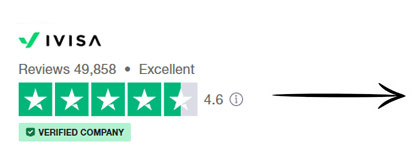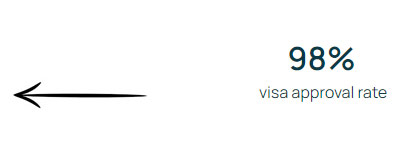India visa requirements for canadian citizens
Find out how to apply for your Indian visa online as a Canadian and a few tips.
 Fast: Simplified, efficient process.
Fast: Simplified, efficient process.
 Security: information is protected.
Security: information is protected.
 Reliability: 98% approval rate.
Reliability: 98% approval rate.
 Assistance: 24/7 customer support.
Assistance: 24/7 customer support.


The Indian electronic visa, also known as e-visa, is a convenient and efficient way for Canadian citizens to travel to India. This e-visa system was introduced to simplify the visa application process and make it easier for Canadians to travel to India. The e-visa application is of great importance for travel to India from Canada. It allows Canadian citizens to obtain their visa quickly and easily without having to physically visit the Indian embassy or consulate. Thanks to this online process, Canadian travellers can avoid administrative hassles and save precious time. On this page, we will provide you with all the information you need to understand the process of applying for an Indian e-visa from Canada. We'll guide you through the application steps, requirements and important tips to make your e-visa application experience smooth and hassle-free. Get ready to explore India with ease with the India e-visa for Canadian citizens.
Visa for India from Canada: in brief
- Requirement: A visa is required for all Canadian citizens wishing to visit India, regardless of the length of stay or the reason for the visit.
- Procedure (online): You can apply for a visa online via the official Indian government website or the website of a private service provider. You need to fill in a form, provide supporting documents and pay the visa fee.
- Processing time: India visas generally take 2 to 4 working days from receipt of your complete application.
- Price: The price of a visa for India is USD 10 for a period of validity of 30 days and USD 40 for a period of validity of one year.
- Validity period: India visas are generally valid for between 1 month and 1 year from the date of issue.


The Indian e-visa is an electronic system that enables eligible travellers to apply for and obtain their visa for India online. Unlike traditional visas, there is no need to visit the Indian embassy or consulate to apply. The e-visa greatly simplifies the process by eliminating tedious paperwork, offering a more convenient way to obtain a visa for India.
The advantages of the Indian e-visa are numerous. It saves Canadian citizens time by avoiding long queues and complex procedures. In addition, it offers flexibility by allowing travellers to apply at any time and from anywhere, as long as they have Internet access. The Indian e-visa also facilitates business travel and tourism by allowing shorter stays and offering different types of visas to suit every situation.
Canadian citizens can benefit from different types of e-visa for India, depending on the purpose of their trip. The most common categories include tourist, business, medical and conference visas. Each visa category has its own specific conditions and requirements.
The tourist visa is intended for people who wish to visit India for tourist activities, such as discovering the country's historical sites, magnificent landscapes and rich culture. The business visa is for travellers going to India for business meetings, conferences, trade negotiations, etc. Medical visas are issued to people travelling to India for medical treatment. Finally, the conference visa is for participants in conferences, seminars, workshops, etc.
To be eligible to apply for an Indian e-visa, Canadian citizens must meet certain conditions. These conditions include possession of a valid passport, submission of necessary documents such as passport photos and accurate personal information when applying online.
It is important to note that the Indian e-visa also has certain restrictions. The stay in India with an e-visa is limited to a specific period, which varies according to the type of visa requested. In addition, the Indian e-visa does not allow you to carry out activities such as paid work, journalism or research.
It is essential to understand the eligibility conditions and restrictions associated with the Indian e-visa before applying to avoid any inconvenience or visa refusal.
India visa fees for Canadian citizens vary depending on the type of visa requested. Here is a summary table of costs for the most common types of visa:
| Type of visa | Duration / Entries | Cost |
|---|---|---|
| Tourist Visa | ||
| e-Tourist Dual-Entry Visa | 30 days | Approx. 10 USD |
| Multi-Entry e-Tourist | 1 year | Approx. 40 USD |
| Business Visa | ||
| Business Visa Multiple Entry | 1 year | Approx. 82.50 USD |
| Medical Visa | ||
| e-Medical Visa | 60 days | Approx. 80 USD |
There may be additional service charges if you apply for the visa via a visa application centre or agency.
Online payments may include transaction fees or currency conversion fees.
The application process for an Indian e-visa from Canada is simple and entirely online. Here are the steps to follow:
When filling in the e-visa application form, it is important to provide information that is accurate and consistent with your passport. Be sure to check the information entered carefully before submitting the application to avoid rejection or delay. Take the time to reread the form and make sure that all the data is correct.
Applying for an Indian e-visa from Canada requires certain documents, including a scanned copy of your valid passport, a recent passport photo with specific requirements (format, size, background, etc.), as well as other additional documents depending on the type of visa requested. Make sure you upload high-quality documents that comply with the requirements.
Indian e-visa fees vary depending on the type of visa applied for and the length of stay. The visa fee must be paid online at the time of application, and various payment options are generally available, such as credit cards, debit cards or online payment services.
Processing times for the Indian e-visa vary, but in general it is advisable to submit the application at least a few weeks before your intended departure date. Visa turnaround times also vary, but most applicants receive their e-visa within 2-7 working days of submitting a complete and compliant application.
Before applying for an Indian e-visa, it is vital to check the validity of your passport. Make sure your passport is valid for at least six months from the date you plan to enter India. If your passport is due to expire soon, it is advisable to renew it before applying for an e-visa.
The Indian government requires that the passports of Canadian travellers have a residual validity of at least six months from the date of entry into India. In addition, the period of validity of the Indian e-visa depends on the type of visa requested. It is essential to comply with these requirements to avoid any problems when entering India.
When a Canadian family plans to travel to India, it's essential to find out about visa requirements, especially for children of Canadian citizens. Unlike some destinations, where children may be exempt from visas or benefit from a simplified procedure, India requires all travelers, regardless of age, to have a visa to enter its territory.
This means that even Canadian children must obtain a visa before traveling to India, whether for vacation or any other reason. The most common type of visa required is the tourist visa, which allows a short stay, generally from 30 to 180 days. This requirement applies to all children, regardless of age, meaning that minors must follow the same procedure as adults.
The visa application can be made online via the official embassy website or a private service provider. Documents required for the application include a valid passport for the child (with a validity of at least six months after the intended date of entry into India), a completed application form, and recent photographs to the specific standards requested. In some cases, additional documents may be required, such as a copy of the child's birth certificate to prove parentage, and copies of the parents' passports.
It is also possible to apply for an electronic visa (e-Visa), an option available to Canadian citizens, although you should check that this procedure is accessible to children, as restrictions may apply depending on age or type of travel. As a general rule, processing a visa for a Canadian child can take several days or even weeks, so it's advisable to submit the application well in advance to avoid any delays in travel arrangements.
It's also important to note that, although the process is relatively straightforward, it can differ from embassy to embassy or consulate to consulate, which is why it's a good idea to check for up-to-date information on visa requirements before starting the process. In conclusion, although the process is similar to that for adults, obtaining a visa for a Canadian child to travel to India requires careful preparation and attention to the documents required.
Find out if your question has been answered in the list below
Canadian citizens can apply for different types of visas for India, such as tourist visas, business visas, medical visas, conference visas, etc. The type of visa depends on the purpose of your trip to India. You can choose between these different types of visa from the website of the private service provider you have chosen for your India e-visa application. Don't hesitate to ask for advice if you're not sure which visa is right for you.
Indian e-visa processing times vary, but in general, most applicants receive their e-visa within 2-7 working days of submitting a complete and compliant application. It is advisable to apply for your e-visa with sufficient time before your planned date of departure. If you are refused, you will have to reapply or go through a more traditional visa application procedure at the embassy or consulate.
No, it is generally not possible to extend the duration of the e-visa once you are in India. The Indian e-visa has a specific validity period, and once this period has elapsed, you will have to leave the country. If you need to stay longer in India, you will need to apply for a regular visa from the Indian embassy or consulate before your trip. There are long-stay visas in India, but no online visas.